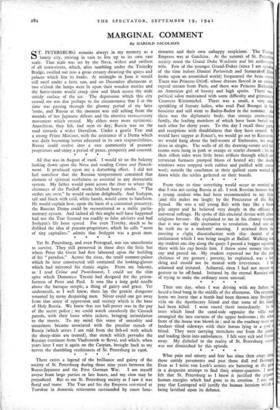Yet St. Petersburg, and even Petrograd, was - too unauthentic to survive.
They still preserved in those days the little but where Peter the Great had first laboured upon the building of his " paradise." Across the river, the small summer-palace which he later constructed still contained the looking-glasses which had mirrored his titanic orgies. From my balcony, as I read Crime and Punishment, I could see the slim spire which Domenico Tresini had designed for the prison- fortress of Peter and Paul. It rose like a long gold needle above the baroque steeple, a thing of gaiety and grace. Yet underneath, as I well knew, there lay the granite dungeons tenanted by many despairing men. Never could one get away from that sense of oppression and secrecy which is the bane of Holy Russia. We knew that our hall-porter was in the pay of the secret police ; we could watch ceaselessly the Cossack patrols, with their loose white jackets, bringing intimidation to the streets. To my mind this sense of unreality and uneasiness became associated with the peculiar stench of Russia (which arises I am told from the fish-oil with which the sheep-skins are treated), that stench which pervades the Russian continent from Vladivostok to Reval, and which, when years later I met it again on the Caspian, brought back to my nerves the shambling restlessness of St. Petersburg in 1906.


























 Previous page
Previous page